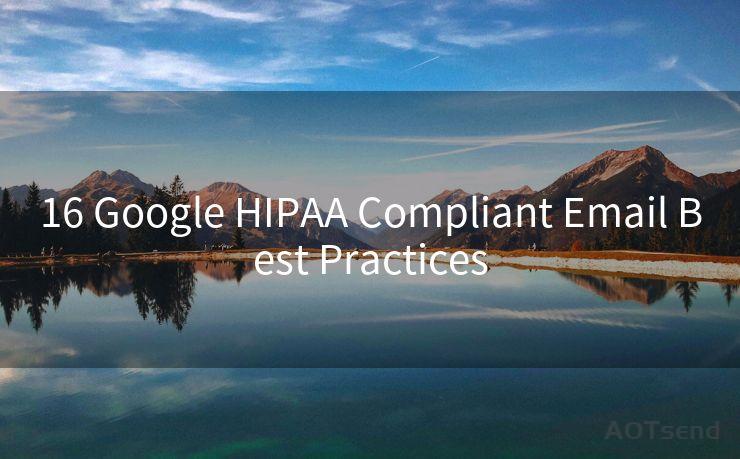16 Google HIPAA Compliant Email Best Practices




When it comes to handling sensitive patient information, compliance with the Health Insurance Portability and Accountability Act (HIPAA) is crucial. Email communication, especially through platforms like Gmail, must adhere to strict privacy and security measures. Here are 16 best practices for ensuring HIPAA-compliant email communication using Google services.
1. Understand HIPAA Requirements
Before sending any HIPAA-related information via email, it's essential to understand the act's privacy and security rules. Familiarize yourself with the specifics of what constitutes Protected Health Information (PHI) and how it should be handled.
2. Use Encrypted Email Services
Google offers encrypted email services through its Gmail platform. Ensure that encryption is enabled when sending sensitive health information to maintain HIPAA compliance.
3. Avoid Unnecessary Disclosure of PHI
When composing an email, carefully consider the necessity of including PHI. If possible, avoid disclosing sensitive information unless absolutely necessary.
4. Utilize Secure File Sharing Options
If you must share documents containing PHI, use secure file sharing options provided by Google Drive or other HIPAA-compliant cloud storage solutions.
5. Implement Two-Factor Authentication
Enhance the security of your Google account by enabling two-factor authentication. This adds an extra layer of protection to your account and reduces the risk of unauthorized access.
6. Regularly Update Passwords
Regularly updating your passwords reduces the risk of account breaches. Use strong, unique passwords and change them periodically.
7. Train Employees on HIPAA Compliance
Ensure that all employees handling PHI are trained on HIPAA compliance and understand the importance of protecting sensitive information.
8. Use Secure Connection (HTTPS)
Always access your Gmail account via a secure HTTPS connection to ensure that data transmitted between your device and Google's servers remains encrypted.
9. Avoid Using Public Networks
When accessing sensitive information, avoid using public Wi-Fi networks, as they may not be secure.

10. Implement Audit Trails
Maintain audit trails to track who accesses PHI and when. This helps in identifying any potential breaches or misuse of information.
11. Utilize Gmail's Confidential Mode
Gmail's Confidential Mode allows you to send emails with expiration dates and password protection, enhancing the security of sensitive emails.
12. Regularly Review and Update Security Settings
🔔🔔🔔
【AOTsend Email API】:AOTsend is a Managed Email Service for sending transactional emails. Support Email Types: reminders, authentication, confirmations, notifications, verification codes, invoices, password resets, account activations, billing statements, two-factor authentication (2FA), and one-time passwords (OTP) emails, etc. $0.28 per 1000 Emails. 99% Delivery, 98% Inbox Rate.
You might be interested in:
Why did we start the AOTsend project, Brand Story?
What is a Managed Email API, How it Works?
Best 25+ Email Marketing Platforms (Authority,Keywords&Traffic Comparison)
Best 24+ Email Marketing Service (Price, Pros&Cons Comparison)
Email APIs vs SMTP: How they Works, Any Difference?
Periodically review your Google account's security settings to ensure they are up to date and provide adequate protection for PHI.
13. Limit Access to PHI
Only grant access to PHI to those who need it for their job functions. Implement appropriate access controls to prevent unauthorized access.
14. Monitor Suspicious Activity
Regularly monitor your Google account for any suspicious activity, such as unauthorized login attempts or unusual email sending patterns.
15. Backup Important Data
Regularly backup any important data, including emails containing PHI, to ensure data recovery in case of any unexpected events.
16. Stay Updated on HIPAA Guidelines
HIPAA guidelines and best practices evolve. Stay updated on any changes to ensure continuous compliance.
In conclusion, following these 16 best practices can help ensure that your use of Google services for HIPAA-related communication remains compliant and secure. Always prioritize the protection of PHI and take proactive measures to prevent any potential breaches.




Scan the QR code to access on your mobile device.
Copyright notice: This article is published by AotSend. Reproduction requires attribution.
Article Link:https://www.mailwot.com/p7218.html



